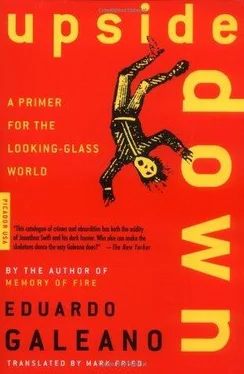• three or four centuries ago, England, Holland, and France practiced piracy in the name of free trade, through the good offices of Sir Francis Drake, Henry Morgan, Piet Heyn, François Lolonois, and other neoliberals of the day
• free trade was the alibi all Europe used while enriching itself selling human flesh in the slave trade
• later on, the United States brandished free trade to oblige many Latin American countries to accept its exports, loans, and military dictatorships
• wrapped in the folds of that same flag, British soldiers imposed opium smoking on China, while by fire and in the name of freedom, the filibuster William Walker reestablished slavery in Central America
• paying homage to free trade, British industry reduced India to the worst penury and British banks helped finance the extermination of Paraguay, which until 1870 had been the only truly independent country in Latin America
• time passed, and in 1954 it occurred to Guatemala to practice free trade by buying oil from the Soviet Union, and the United States promptly organized a devastating invasion to set things straight
• shortly thereafter, Cuba, also failing to see that free trade consisted of accepting prices as imposed, purchased outlawed Russian oil; the terrible fuss that ensued led to the Bay of Pigs invasion and the interminable blockade.
These historical antecedents teach us that free trade and other such monetary freedoms are to free peoples what Jack the Ripper was to Saint Francis of Assisi. The free market has transformed the countries of the South into bazaars filled with imported trinkets that most people can see but not touch. Nothing has changed since the far-off days when merchants and landowners usurped the independence won by barefoot soldiers and put it up for sale. That’s when the workshops that might have incubated national industries were annihilated, when ports and big cities razed the hinterlands, choosing the delights of consumption over the challenges of creation. Years have passed and in Venezuela’s supermarkets I have seen little plastic bags of water from Scotland to drink with your whiskey. In Central America’s cities, where even rocks sweat buckets, I have seen fur stoles on fancy ladies. In Peru, I’ve seen German electric floor waxers for homes with dirt floors and no electricity; in Brazil, plastic palm trees bought in Miami.
Another path, the inverse one, was taken by developed countries. They never had Herod to their childhood birthday parties. The free market is the only commodity they produce without any subsidies, but it’s only for export. They sell it, the South buys it. Their governments generously aid national agricultural production so that they can flood the South with food at ridiculously low prices despite ridiculously high costs, and so condemn the farmers of the South to ruin. The average rural producer in the United States receives state subsidies a hundred times greater than the income of a farmer in the Philippines, according to UN figures. And don’t forget the ferocious protectionism practiced by developed countries when it’s a matter of what they want most: a monopoly on state-of-the-art technologies, biotechnology, and the knowledge and communications industries. These privileges are defended at all cost so that the North will continue to know and the South will continue to repeat, and thus may it be for centuries upon centuries.
Many economic barriers remain high, and human barriers higher yet. No need to look further than Europe’s new immigration laws or the steel wall being erected by the United States along its border with Mexico. This is no homage to the Berlin Wall but one more door slammed in the face of Mexican workers who refuse to acknowledge that the freedom to change countries is money’s privilege. (To make the wall less unpleasant, the plan is to paint it a salmon color, display tiles of children’s artwork on it, and leave little holes to peek through.)
Language/1
Companies are called “multinationals” because they operate in many countries at once, but they belong to the few countries that monopolize wealth; political, military, and cultural power; scientific knowledge; and advanced technology. The ten biggest multinationals today earn more than a hundred countries put together do.
“Developing countries” is the name that experts use to designate countries trampled by someone else’s development. According to the United Nations, developing countries send developed countries ten times as much money through unequal trade and financial relations as they receive through foreign aid.
In international relations, “foreign aid” is what they call the little tax that vice pays to virtue. Foreign aid is generally distributed in ways that confirm injustice, rarely in ways that counter it. In 1995, black Africa suffered 75 percent of the world’s AIDS cases but received 3 percent of the funds spent by international organizations on AIDS prevention.
Every time they get together, and they get together with pointless frequency, the presidents of the Americas issue resolutions insisting that “the free market will contribute to prosperity.” Whose prosperity, they don’t say. Reality — which exists even if sometimes barely noted and which is not mute even if sometimes it keeps its mouth shut — tells us that the free flow of capital only fattens drug traffickers and the bankers who offer refuge to their narco-dollars. The collapse of public financial and economic controls provides good cover, allowing for the more efficient organization of drug distribution and money-laundering networks. Reality also tells us that the green light of the free market helps the North express its generosity, by offering the South and East as gifts its most polluting industries, its nuclear waste, and other garbage.

Language/2
In 1995, the Argentine press discovered that certain directors of the state-owned Banco Nación had received $37 million from IBM in return for a service contract $120 million above the usual price.
Three years later, the directors acknowledged that they had taken the money and deposited it in Swiss bank accounts, but they had the good taste to avoid using the word “bribe” or the rude expression “payoff”: one of them used the word “gratuity,” another said it was a “douceur,” and the most delicate among them explained that it was just “a sign of IBM’s happiness.”
Language/3
In the Victorian period, one did not speak of trousers in the presence of an unmarried woman. Today, there are certain things one can’t say in the face of public opinion:
• capitalism wears the stage name “market economy”
• imperialism is called “globalization”
• the victims of imperialism are called “developing countries,” much as a dwarf might be called a “child”
• opportunism is called “pragmatism”
• treason is called “realism”
• poor people are called “low-income people”
• the expulsion of poor children from the school system is measured by the “dropout rate”
• the right of bosses to lay off workers with neither severance nor explanation is called “a flexible labor market”
• official rhetoric acknowledges women’s rights among those of “minorities,” as if the masculine half of humanity were the majority
• instead of military dictatorship, people say “process”
• torture is called “illegal compulsion” or “physical and psychological pressure”
• when thieves belong to a good family they’re “kleptomaniacs”
Читать дальше












